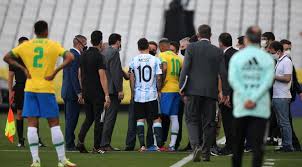By Samindra Kunti
September 6 – In an extraordinary and unprecedented sequence of events, officials from the Brazilian health authority Anvisa stormed on to the pitch of the World Cup qualifier between Brazil and Argentina after four minutes to deport four Argentine players from England’s Premier League, leading to the match being abandonment.
The two South American giants have a historically rich rivalry that has long drawn attention from around the globe and on Sunday they met in qualifier en route to the 2022 World Cup in Qatar. At least that was the plan until local health authorities decided to take matters into their own hands.
The match had been given the go-ahead from Conmebol, the Brazilian FA (CBF) and Brazil’s federal government, meaning that a mandatory 14-day quarantine didn’t apply to players coming from the United Kingdom, exempting Emiliano Martinez, Giovani Lo Celso, Christian Romero and Emiliano Buendia.
But three hours before kick-off Anvisa issued the decision that those four Premier League players in the Argentinean delegation should be deported. That decision was reportedly ignored by the Argentine Fa (AFA) with the backing of the CBF.
“Anvisa considers the situation a serious health risk and so has asked local health authorities to determine the immediate quarantine of the players, who are stopped from participating in any activity and should be prevented from remaining on Brazilian soil,” said Anvisa in a statement.
In an interview with Brazilian broadcaster Globo, the chairman of Anvisa Antonio Barra Torres said their protests were ignored by both CBF and Conmebol.
Anvisa sent agents, accompanied by the federal police, to the match. Brazil’s health ministry didn’t deny the existence agreement with the football authorities, but said that it still supported Anvisa in the decision to stop the game. Various media reports claim that the four Argentinean players lied on their immigration form, not revealing that they ply their trade in the UK.
With live footage still rolling, Lionel Messi asked the Brazilian health authorities: “We’ve been here for three days, why are you doing this just now?!” His team walked off, but the hosts remained pitch-side to avoid the risk of ‘forfeiting’ the game and staged an impromptu training session.
Conmebol was quick to shrug off any responsibility, the question of which is a hornet’s nest with Mercosur and Conmebol having a protocol for matches on South American soil and FIFA having its own rules.
“The referee and the match official will take a report to the FIFA Disciplinary Committee and they will decide what steps to take,” said Conmebol in a statement.
“You cannot talk about any lie here because there is health legislation under which all South American tournaments are played,” said AFA president Claudio Tapia. “The health authorities of each country approved a protocol that we have been fully complying with.”
With the tension between European clubs and South American national teams at a high before this international window, the roles of both FIFA and Conmebol as well as the two national federations are highly questionable following the Sao Paulo fiasco.
The World Leagues Forum, Premier League, La Liga, Serie A, Ligue 1 and European Club Association (ECA) all resisted releasing players to red-zone countries, but FIFA demanded players be allowed to travel and also won a case at CAS against La Liga over the extension of the international window by two days in South America to allow Conmebol to catch up on missed matches in Qatar 2022 qualifying.
The farce highlighted that ploughing ahead with a full calendar in the midst of a global pandemic has its limits.

